2014 TABLOID WITCH AWARD WINNERS ANNOUNCED
by Thomas M. Sipos, managing editor [September 14, 2014]
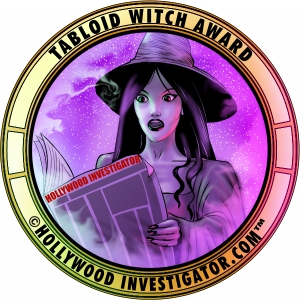 [HollywoodInvestigator.com] For the 11th year in a row, the Hollywood Investigator is happy to announce the winners of its Tabloid Witch Awards horror film contest. [HollywoodInvestigator.com] For the 11th year in a row, the Hollywood Investigator is happy to announce the winners of its Tabloid Witch Awards horror film contest.
Of 159 films considered this year (up from last year's 85), winning films hailed from the Czech Republic, Columbia, England, Ireland, Poland, Spain, and the United States.
As for trends in horror, judging by this year's output, serial killers and psychos have overtaken zombies in popularity. Supernatural films were also heavily represented. Far fewer filmmakers are producing horror/sci-fi films than films in other subgernes.
Three of this year's winning films had budgets of about $500, demonstrating that you don't need big money to produce big quality horror.
Here now are 2014's Tabloid Witch Award winning films:
* Best Horror Feature: Judas Ghost
While not the most original feature film of the year (borrowing elements from both The X-Files and Poltergeist: The Legacy), it is one of the slickest and most entertaining. Moving like a well-oiled monster machine, Judas Ghost sprints to a quick start, its paranormal investigators leaping into their assignment from the opening reel, not bothering with expositions or introductions. From there the pace never slackens, the film hurtling from scare to scare, like the proverbial funhouse rollercoaster (to mix metaphors) that horror is often likened to.
Production values are professional across the board, contributing to both the atmosphere and the scares. Like cotton candy, Judas Ghost is more enjoyable than memorable. It won't linger in the mind, but it tastes great going down.
Judas Ghost has a website.

* Best Dramatic Horror Short: The First Step
A family moves into a new house. Sara (Payton Walker), a little girl, hears noises in the cellar. That night Sara lies awake in her bedroom with the lights on. She still hears the noises. Creaking noises. Someone -- or something -- coming up the stairs. Creaking. Croaking. Calling out her name...
The First Step is terror stripped to its essence. No big dramatics or buckets of blood. Just a simple tale told mostly through sound and suggestion. The celler dweller (Jo Anna Van Thuyne) is poorly seen. Low lighting and a soft focus obscure the make-up effects' rough (low-budget) edges. The monster's creepiness is further heightened by Van Thuyne's herky-jerky body movements, which suggest a thing disjointed, ugly, and best left unseen.
Sound does much to enhance this film. Especially admirable is the basement door creaking open, blending into the creature's creaking and croaking. Great care was also taken with changes in the ambient sound as directors Daniel Brown and Kate McMean show us several dimly-lit and empty rooms at night, emphasizing the loneliness of the house.
More details at Wide Eyed Pictures's website.

* Best Comedic Horror Short: Psychic Sue
Fake psychic Sue (Andrea Coyne) is visited by the ghost of Andy (Joseph Stacey), a former lover. Andy suggests that Sue find a real psychic so they can communicate more clearly, as it's both difficult and expensive to communicate with unbelievers from the afterlife, and he's running out of change. Sue goes to real psychic Zoe (Sarah Agha) for Andy's message, but alas, the news isn't good...
Although it's a simple story, Psychic Sue packs a lot of humor into its short 13 minutes. The dialog is full of funny lines, expertly delivered by a talented cast. That includes Kate Finegan as Jennifer, a befuddled client who has trouble deciphering Sue's pretentiously spiritual gobbledygook.
The psychic reading rooms are nicely lit, their set decor well-appointed with occult paraphernalia. Actually, Sue's and Zoe's reading rooms look identical. Sue notices this as she enters, but quickly ignores the strange coincidence. Sure, using the same room for both psychics made it easier on the film crew and the budget, but it also supports the humor. Monty Python often used the same sets for comedic effect, the characters pretending not to notice.
Psychic Sue is not the slickest or most expensive-looking horror comedy short this year, but it's full of charm and whimsy, funny lines and unexpected twists, capped with a simple but accurate life lesson.
Shot in Ireland with an Irish cast, by Apeiron Films, a German production company.

* Best Animated Horror Short: Za Edgara
Literary historians have long speculated about the inspirations behind Edgar Allan Poe's stories and poems. So have filmmakers. There is The Spectre of Edgar Allan Poe. There is Torture Garden's "The Man Who Loved Poe" episode. And there is also Za Edgara (aka To Edgar), a 6 minute animated film from Poland by Ewa Łuczków.
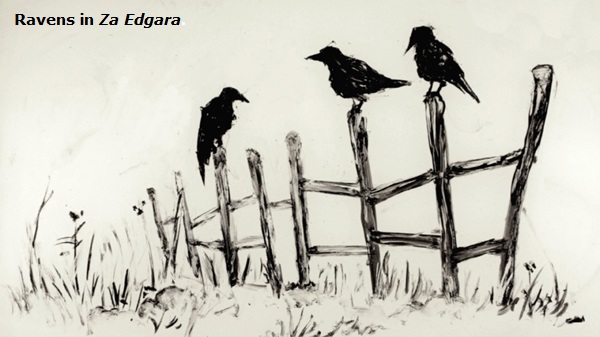
Using dark elegant lines against a sepia background (actually, paint on glass), Tuczkow animates a frustrated Poe struggling with writer's block. Quill pen posed over blank sheets, Poe glares silently, simmering and stewing, amid constant disturbances, from an irritatingly helpful wife to a disruptive black cat. When Poe can stand it no longer, he explodes into madness and literary legend.
Za Edgara has no dialog, nothing to identify its protagonist other than the icons that have become associated with Poe -- ravens, a black cat, a swinging pendulum on a grandfather clock, and Poe's own darkly brooding features. The film is a gem of visual storytelling, its minimalist lines conveying atmosphere, character, and events, all darkly horrific.

* Best Avant-Garde Horror Short: Lancaster Square
A young woman in a nightgown (Jenny Savage) wanders the empty halls of an apartment building, seeking the source of a baby's cries. Such narrative minimalism requires mood and mystery for it to intrigue and unsettle, and Eric Norcross's Lancaster Square delivers. The lighting is subtly menacing rather than obviously threatening. Janani Sreenivasan's minimalist, ominous score supports rather than overpowers the visuals.
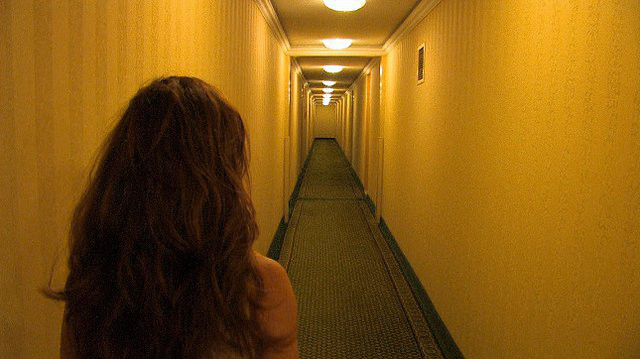
Curiously, this year we received two short films about someone wandering the empty halls of a hotel or apartment building. Both films have subtly paranormal overtones and avant-garde elements. But Lancaster Square has something the other film doesn't. While many experimental films explore the bizarre for bizarro's sake, Lancaster Square's provocative ending offers food for thought.
Just what does its ending mean? Watch the film through to its end credits, several times over, and you might change your mind. Several times. In the best avant-garde tradition, Lancaster Square is more thought-provoking than polemic.
Eric Norcross has a website.

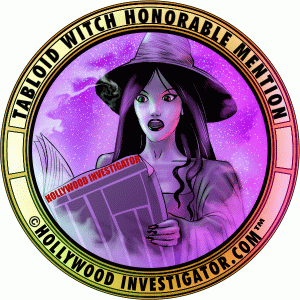 * Honorable Mention * Honorable Mention
Because of the extremely competative nature of the Tabloid Witch -- so many films to consider! -- winning an Honorable Mention is indeed cause for pride.
* Ticket to the Haunted Mansion
A city council representative (Daniel Nemes) visits a haunted house attraction to see if it complies with building safety codes. His officious attitude offends the ticket attendant (Jay Lawrence Kiman). His arrogant disbelief offends the main attraction -- a spectral hag named Deadly Daisy (Nikki Bohm). As one might expect, the inspector soon regrets his skepticism...
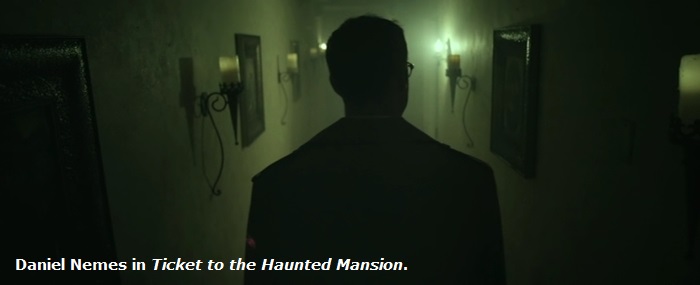
Writer/director Nuntakul Sakulchai tells a familiar horror yarn -- The arrogant skeptic gets his comeuppance. But he tells it exceptionally well. It's been said there are no new stories, that a film's success lies in its execution. Ticket to the Haunted Mansion benefits from a tight script that never bores. The actors are well cast and perform well. Chia-Yu Chen's beautifully eerie cinematography captures a house with richly atmospheric decor.

* Timothy
Serial killers and psychos remain a popular horror villain. Many entries this year had slashers. And many of them simply went through the motions, hacking and slashing in rote fashion, racking up their body counts with clockwork regularity. There's a reason so many modern psycho films are called torture porn.
Timothy offers more. Apart from its excellent production values -- sound, photography, make-up, music, art direction, and acting are all great -- its story and direction also rise above your typical slasher fare. Writer/director Marc Martínez Jordán strikes the perfect balance between fear and dark humor. Looking up from a fresh kill, the psycho Timothy (in a giant rabbit costume) greets a shocked boy with childish glee. The incident is hilarious, yet in a way that is simultaneously scary.
Costume designer Isis Velasco's rabbit outfit treads the fine edge of cutesy and creepy. Like the Teletubbies, Timothy is the sort of TV character who delights children, yet unnerves observant adults. As with some clowns, there's a hint of child molester in that rabbit costume. The film's music is also appropriate and effectively used, alternating from suspenseful to humorous to softly melodic at the right dramatic moments.
This Spanish film offers everything a fan could want in a slasher film. Although technically, Timothy is not a slasher. He favors an iron mallet. Some psychos slash. Others just bash. It's all good.
Marc Martínez Jordán has a website.

* The Heebie-Jeebies
A mother reads a scary bedtime story to her two small children ... but was it only a story? The Heebie-Jeebies is a gently humorous, old-fashioned spook tale, reminiscent of R.L. Stine's young adult Goosebumps novels, which should nevertheless entertain young and old alike. Production values are strong, from Patrick Ruth's beautiful photography, to the ghostly sounds that efficiently convey the children's fearful imaginings, to the final visual effects.
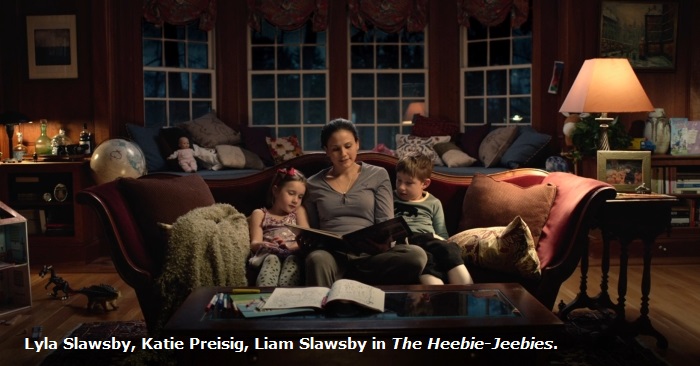
Frederik Wiedman's fantastical music has a Danny Elfman quality, spooky but not overly dark. The admirable cast includes harried mom Katie Preisig, dufus dad Brendan Mulhern, and the two kids, Liam and Lyla Slawsby. Their father, writer/director Todd Slawsby, has created a delightful family fright film, as tightly written and slickly executed as any Hollywood big studio product.

* Zugar Zombie
There weren't as many zombie films in 2014 as in past years, but they still keep sauntering in, the best being Zugar Zombie. While some recent zombie films try to modernize the walking dead, this Columbian film enthusiastically embraces all those classic zombie film tropes of decades past -- gore, dark humor, political satire, and zombies that shamble rather than run.
Writer/director Alexander Quezada's story concerns a mayor's (Marcial Martínez) corrupt re-election campaign. When his attempt to bribe voters with cheap, tainted food creates a zombie outbreak, his priority becomes suppressing the scandal, even at the cost of his campaign workers' lives.
Zugar Zombie's comedic overtones are enhanced by its bright and colorful cinematography. Editing is fast-paced, energetic ... and enigmatic. One online critic says the film tells the story backwards, but really, the scenes are a jumble, bouncing back and forth in time, eventually settling on the key shots that put all the preceding events into perspective. Only then do those events suddenly make sense.
This curious editing choice is Zugar Zombie's only concession to modern film language. Otherwise, you'd think you were watching something from Italy in the 1980s.

* The Fear Box: 666 Telemarketing
While some horror filmmakers strive for increasingly nihilistic gore (can that envelop be pushed any further?), Mari Cielo Pajares has scripted a violence-free, old-fashioned morality tale about good vs. evil -- from an unabashedly Christian perspective. The Fear Box: 666 Telemarketing was not the only film this year about Satan's search for souls, but it was the best.
The film is well-paced. Director Jose Angel Henrickson opens on a humorous note, injecting fear a third of the way in, whereupon the suspense keeps building, events darkening, until an unexpected twist ending. (Not easy to do with such a familiar trope.)
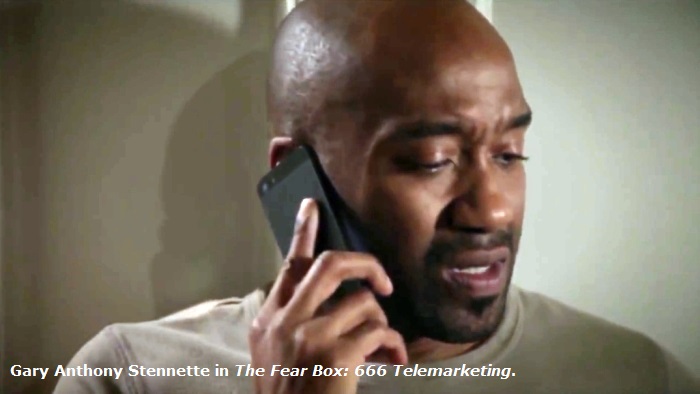
While production values are professional across the board, actor Gary Anthony Stennette raises the film's talent bar still higher with his excellent portrayal of a man harassed by Satan's telemarketing minions. Writer Pajares does double-duty (and a good job) as the demon on the other end of the phone line.

* The Stomach
Here's a ghost story that is neither subtle or spooky. The Stomach is brutal, gory, visceral horror. Spirits manifest inside the stomach of an unfortunate medium (Simon Meacock), who wants out of the séance business. But will the hoodlums who seek information from their dead partners let the medium retire?
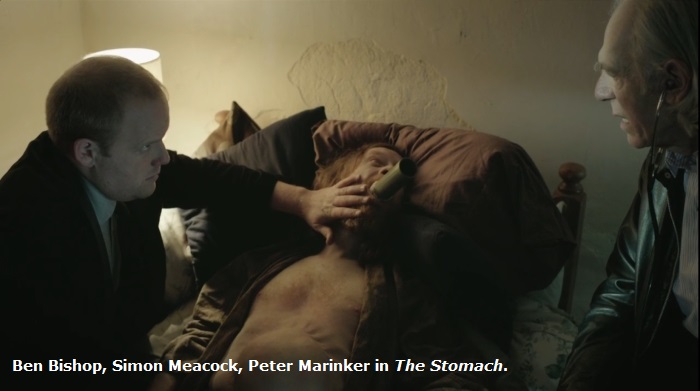
The raw underworld characters in this English film evoke those in The Long Good Friday and Lock, Stock, and Two Smoking Barrels. Imagine seeing them through the distorting, flesh-obsessed lens of a Clive Barker or David Cronenberg, and you'll have an idea of The Stomach's mood and milieu. Yet within those familiar styles, writer/director Ben Steiner tells an admirably original ghost story. Production values are first rate, as is the entire cast.

* Banshee
A young man (Michael Hamory) suffers a "heart attack" in the dead of night, leaving his wife (Eva Larvoire) to uncover the cause of his heart failure. (Hint, the title is a giveaway.) Her sleuthing recalls Naomi Watt's investigative legwork in The Ring, while the banshee's movements evoke the ghosts of Insidious. But it's Larvoire's performance that anchors Banshee in a realism that makes the film's supernatural conceit so believable.
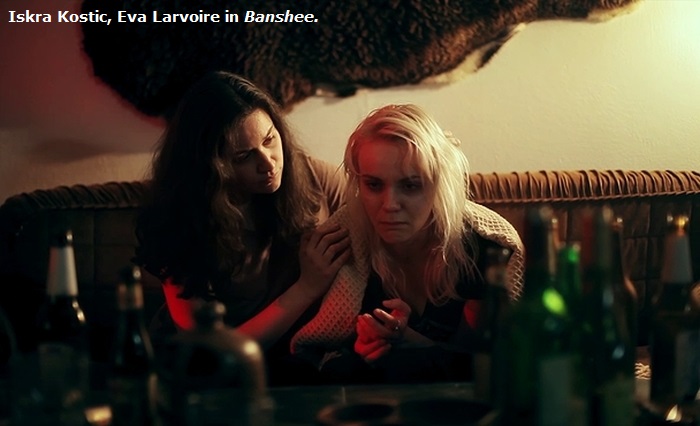
Banshee is a Czech film set in Ireland (the banshee is Irish legend), and while I don't know where it was shot, the hills of the Emerald Isle can't look any greener or more verdant than those depicted in Sophia Richards's beautifully atmospheric cinematography. With a budget of 400 Euros (only about $518), writer/director Sean van Leijenhorst has crafted a slick-looking spook story with impressive acting, sound, music, and make-up effects. Once again proving you don't need professional-sized budgets to make professional quality films.

* Additional Winners
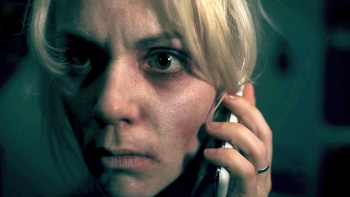 Bashee would have been just another Irish ghost story but for actress Eva Larvoire. As the distraught wife of a banshee victim, Larvoire emotes with the realism of a seasoned method actress. Many horror actors scream and cry and shout with just enough conviction to create entertaining frights -- provided viewers willingly suspend their disbelief. Great performers don't require such an audience assist, because the depth of their emotions onscreen are real rather than artificial, their characters lingering in the mind long after the story is forgotten. Bashee would have been just another Irish ghost story but for actress Eva Larvoire. As the distraught wife of a banshee victim, Larvoire emotes with the realism of a seasoned method actress. Many horror actors scream and cry and shout with just enough conviction to create entertaining frights -- provided viewers willingly suspend their disbelief. Great performers don't require such an audience assist, because the depth of their emotions onscreen are real rather than artificial, their characters lingering in the mind long after the story is forgotten.
Such is Eva Larvoire's performance, for which she wins the Best Actress Award.
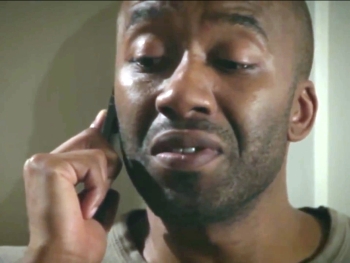 The Fear Box: 666 Telemarketing is about one man talking on the phone. That's almost all we ever see. We glimpse Satan's minion on the other end only briefly, and even then, only partly. Which means the actor playing that one man becomes critical to the film's success. The Fear Box: 666 Telemarketing is about one man talking on the phone. That's almost all we ever see. We glimpse Satan's minion on the other end only briefly, and even then, only partly. Which means the actor playing that one man becomes critical to the film's success.
Gary Anthony Stennette rises to the task, displaying the range of emotions of a man whose drab life is unexpectedly shattered when he must suddenly fight for his soul. Stennette segues through boredom, bemusement, anger, rage, terror, despair, defeat, relief, and gratitude -- all with seemingly effortless naturalism.
Gary Anthony Stennette wins for Best Actor.
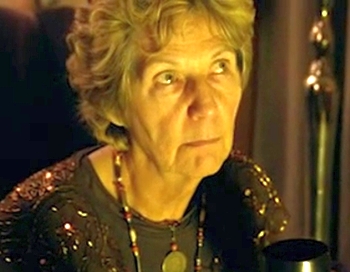 As Dark Vision's eccentric, slightly tipsy, haunted house caretaker, Judith Haley's very presence is like a page torn from an old English ghost story. (Or a reel from such classic films as Dead of Night, if you prefer film analogies.) Dismissing the young upstart ghost-hunters, with all their modern gizmos, Haley relates historical incidents full of dark portent, leavened with comedic timing, much like the great English character actors of yesteryear. As Dark Vision's eccentric, slightly tipsy, haunted house caretaker, Judith Haley's very presence is like a page torn from an old English ghost story. (Or a reel from such classic films as Dead of Night, if you prefer film analogies.) Dismissing the young upstart ghost-hunters, with all their modern gizmos, Haley relates historical incidents full of dark portent, leavened with comedic timing, much like the great English character actors of yesteryear.
Judith Haley wins for Best Supporting Actress.

Actors often shine best when biting into the role of a juicy villain. As Judas Ghost's Judas ghost, Grahame Fox bites with the gusto of a ravenous wolf. Laughing maniacally, his orifices oozing blood, Fox's malevolent spirit revels in pure evil, inflicting pain and death with Satanic glee.
Grahame Fox wins for Best Supporting Actor.
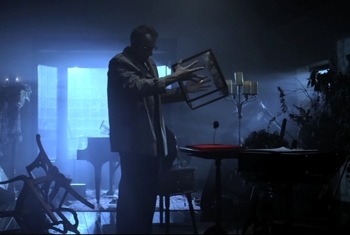 A properly scary haunted house must be drenched in atmosphere (as least if it's to avoid the disaster of The Haunting's criminally dreadful remake). A properly scary haunted house must be drenched in atmosphere (as least if it's to avoid the disaster of The Haunting's criminally dreadful remake).
The funhouse attraction in Ticket to the Haunted Mansion is filled with colored lights and somber shadows and smoky rooms, all suggesting a creepy supernatural presence amid the decaying family heirlooms.
Chia Yu-Chen wins for Best Cinematography.
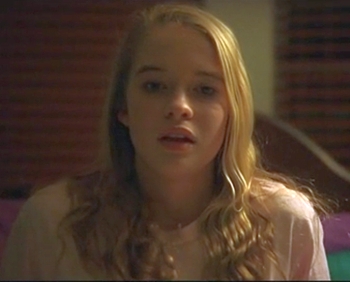 Many films boasted professional sound recording and mixing. None put sound to better aesthetic effect than did The First Step. Many films boasted professional sound recording and mixing. None put sound to better aesthetic effect than did The First Step.
The heavy ambient room tones throughout the house emphasize its foreboding emptiness. It feels as if even mom has abandoned Sara to the house (even if we know that mom's still around somewhere, albeit asleep and useless). The cellar dweller, mostly obscured by dim lighting and a soft focus, is largely suggested by its croaking voice, its approach by the creaking stairs.
The Best Sound award goes to Daniel Brown.
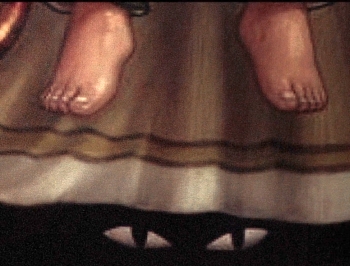 Zugar Zombie's nonlinear editing is self-consciously stylized, but it serves mostly to confuse. By contrast, The Heebie-Jeebies's editing propels the story. The sedentary act of a mother reading to her two children becomes a dynamic experience as the film quickly crosscuts amid an array of images -- the children's fearful faces, rack focuses of drawings and texts in the storybook, suddenly menacing room furnishings, POV shots from outside as the little girl imagines something peering at her through the window... Zugar Zombie's nonlinear editing is self-consciously stylized, but it serves mostly to confuse. By contrast, The Heebie-Jeebies's editing propels the story. The sedentary act of a mother reading to her two children becomes a dynamic experience as the film quickly crosscuts amid an array of images -- the children's fearful faces, rack focuses of drawings and texts in the storybook, suddenly menacing room furnishings, POV shots from outside as the little girl imagines something peering at her through the window...
The editing is both efficient and unobtrusive, serving the narrative rather than drawing attention to itself. A fast-paced style that highlights the chills and laughs, trimming any fat that might hinder either the horror or the comedy.
Harold Parker wins for Best Editing.
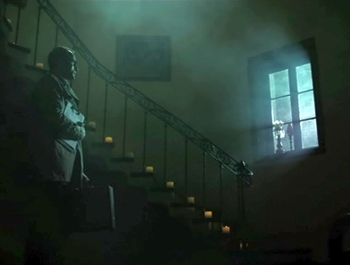 If the entire story is no more than one man's scary encounters in a haunted house, then that house better appear convincingly scary and haunted. If the entire story is no more than one man's scary encounters in a haunted house, then that house better appear convincingly scary and haunted.
The old house in Ticket to the Haunted Mansion is just that. Dusty portraits and decrepit furnishings, glowing candles and dim chandeliers, smoky rooms obscured by shadows -- all contributing to an atmosphere where the supernatural becomes believable.
Aprile Lanza Boettcher wins for Best Production Design.
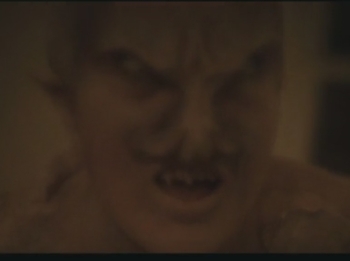 This year saw the usual greenish-gray zombie faces, rubbery monster masks, and prosthetic wound effects. The cellar dweller in The First Step was more original, with its hideously distended body and gnarled face. If any of it looked artificial, that was admirably obscured by the low lighting and soft focus, leaving much of the creature to our imagination. This year saw the usual greenish-gray zombie faces, rubbery monster masks, and prosthetic wound effects. The cellar dweller in The First Step was more original, with its hideously distended body and gnarled face. If any of it looked artificial, that was admirably obscured by the low lighting and soft focus, leaving much of the creature to our imagination.
Here was a striking creature effect conceived in a way that served both the story and the low budget -- $500 for the entire film.
Delia De Cock wins for Best Make-Up Effects.
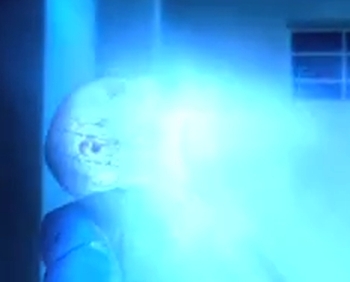 Four paranormal investigators stuck in a single room for the duration of a feature film better have something interesting to do -- or see -- lest events grow static and dull. Luckily (for audiences, if not for the investigators), the room is cursed with some very bad -- but very photogenic -- mojo. Four paranormal investigators stuck in a single room for the duration of a feature film better have something interesting to do -- or see -- lest events grow static and dull. Luckily (for audiences, if not for the investigators), the room is cursed with some very bad -- but very photogenic -- mojo.
Judas Ghost is not about the characters in the roller coaster, but the ride itself. A series of hauntings and supernatural manifestations, realized by a variety of impressive special effects, makes for an exhilarating ride.
John Swinnerton wins for Best Visual Effects.
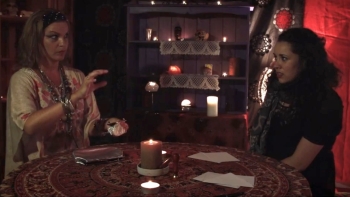 Its music sets the mood from the opening credits. A simple melody of ethereal whimsy, informing viewers that what follows will be spooky but amusing. And it maintains that emotional tone through the length of Psychic Sue, supporting the events onscreen while softening the rough edges of a delightful, but obviously low-budget, piece of fluff. Other films had music as good, but no music did more to support the film. Its music sets the mood from the opening credits. A simple melody of ethereal whimsy, informing viewers that what follows will be spooky but amusing. And it maintains that emotional tone through the length of Psychic Sue, supporting the events onscreen while softening the rough edges of a delightful, but obviously low-budget, piece of fluff. Other films had music as good, but no music did more to support the film.
Mirko Rizzello wins for Best Music Soundtrack.

* The Final Tally
Tabloid Witch
Award Winners
|
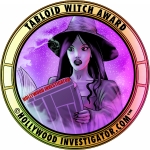
|
*
Best Horror Feature Film .......................... Simon Pearce & Simon R. Green (Judas Ghost)
*
Best Dramatic Horror Short Film .............. Daniel Brown & Kate McMeans (The First Step)
*
Best Comedic Horror Short Film .............. Dave Lojek & Gemma Swain (Psychic Sue)
*
Best Animated Horror Short Film .............. Ewa Łuczków (Za Edgara)
*
Best Avant-Garde Horror Short Film ......... Eric Norcross (Lancaster Square)
*
Best Actress .............................................. Eva Larvoire (Banshee)
* Best Actor ................................................. Gary Anthony Stennette (The Fear Box: 666 Telemarketing)
* Best Supporting Actress
........................... Judith Haley (Dark Vision)
* Best Supporting Actor
............................... Grahame Fox (Judas Ghost)
* Best Cinematography
............................... Chia-Yu Chen (Ticket to the Haunted Mansion)
* Best Sound ................................................ Daniel Brown (The First Step)
* Best Editing ............................................... Harold Parker (The Heebie-Jeebies)
* Best Production Design ............................ Aprile Lanza Boettcher (Ticket to the Haunted Mansion)
* Best Visual Effects
.................................... John Swinnerton (Judas Ghost)
* Best Make-Up Effects
............................... Delia De Cock (The First Step)
* Best Music Soundtrack
............................. Mirko Rizzello (Psychic Sue)
Tabloid Witch
Honorable Mentions
|
|
* Jose Angel Henrickson & Mari Cielo Pajares (The Fear Box: 666 Telemarketing)
* Marc Martínez Jordán (Timothy)
* Todd Slawsby (The Heebie-Jeebies)
* Alexander Quezada (Zugar Zombie)
* Nuntakul Sakulchai (Ticket to the Haunted Mansion)
* Ben Steiner (The Stomach)
* Sean van Leijenhorst (Banshee)

|
